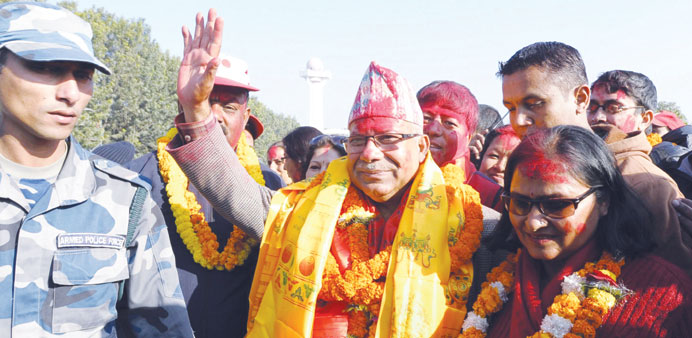Communist Party of Nepal (Unified Marxist-Leninist) leader Madhav Kumar Nepal, centre, waving to supporters at a rally celebrating the party’s election result outside a vote counting centre in Kathmandu yesterday.
IANS
|
|
Many senior leaders in Nepal politics, particularly from the mainstream United Communist Party of Nepal-Maoist (UCPN-M) and Madhesi parties, have lost in Tuesday’s constituent assembly elections as counting of votes cast for the 240 first-past-the-post seats continued yesterday across this Himalayan nation.
At least three former deputy prime ministers from the UCPN-M and Madhesi parties have lost the elections, the results of which were declared in Kathmandu by the election commission.
This follows the defeat on Thursday of UCPN-M chairman Pushpa Kamal Dahal Prachanda from the
Kathmandu-10 constituency.
From the results that are coming out, it is evident that the people have rejected outright the radical agenda pushed forward jointly by the Maoists and Madhesis and voted for moderate forces like the centre-right Nepali Congress (NC) and moderate Communist Party of Nepal-Unified Marxist Leninist (CPN-UML).
Since the first constituent assembly elections in 2008, the UCPN-M and the Madhesi parties were one in raising radical agenda - propagating ethnicity-based federalism and directly-elected president system in the new political set-up.
Madhesi parties had raised the issue of ‘One Madhes-One Pradesh’ as their supporters are mainly from areas bordering
India.
Among prominent UCPN-M leaders losing in the elections is outgoing prime minister and senior Maoist leader Baburam Bhattarai who lost to senior CPN (UML) leader Bishnu Poudel in Rupandehi-4
constituency.
Though Bhattarai was elected from another constituency, Gorkha-1, already, he came third in Rupandehi.
Likewise, another senior Maoist leader and former deputy prime minister and minister for foreign affairs Narayan Kaji Shrestha lost to CPN-UML candidate Subash Thakuri.
“I have taken the verdict easily. For a politician, winning or defeating in polls are part of life,” Shrestha said.
Former deputy prime minister and minister for home affairs Bijaya Kumar Gachhadar, a Madhesi leader who belongs to the southern plains region of the country, also lost the elections to NC leader Shekhar Koirala. Gachhadar is also the chairman of the Madhesi Jana Adhikar Forum (Democratic).
Another former deputy prime minister and minister for foreign affairs Upendra Yadav lost to NC candidate Amrit Aryal.
Similarly, senior Maoist leader and former finance minister and top commander of the People’s Liberation Army (PLA) during the people’s war, Barsha Man Pun, also lost the elections.
Former PLA deputy commander and senior Maoist leader Nanda Kishor Pun lost in Kathmandu to popular NC leader Gagan Thapa.
Another Madhesi leader from the southern plains, Anil Jha, also lost to senior CPN-UML leader and former prime minister Madhav Kumar Nepal in Rautahat district bordering
India.
With many senior Maoist leaders who lost the elections trying to disown the election results even as many aspects of Nepal’s peace process and writing a new constitution remain yet incomplete, leaders from the winning parties have started reaching out to the Maoists.
“Without Prachanda’s participation, it is impossible to complete the peace and constitution writing process. So the new Constituent Assembly needs Prachanda,” said a senior NC leader.
Senior Maoist leaders and former ministers Lekh Raj Bhatta and Posta Bahadur Bogati also suffered defeat.
Devendra Poudel, chief political adviser to former prime minister Bhattarai, also lost in Kathmandu.
Several other senior Maoist and Madhesi leaders were trailing behind their NC and CPN-UML rivals.
The results indicate that the traditional political forces are likely to dominate the composition of the new Constituent
Assembly.
In 2008, the Maoists had emerged as the single largest party securing 120 seats out of the 240 seats set aside for first-past-the-post polls. The NC had secured 37 while the CPN-UML won 30 seats.
But this time, the poll results indicate that the traditional forces are likely to dominate the composition of the new Constituent Assembly. According to the election commission, it will take at least a week to deliver the final results.
The commission said the people used their votes to seal the fate of around 17,000 candidates — 6,126 under the first-past-the-post and 10,709 under the proportional representative systems — belonging to 122 political parties in the fray in 575 constituencies. The constituent assembly has a total of 601 seats.
For the first-past-the-post election, 240 seats were allocated to 75 districts of Nepal, while 335 seats are to be filled on the basis of proportional representation.
Members for the remaining 26 seats will be nominated by the cabinet representing various walks of life after the formation of the new constituent
assembly.

